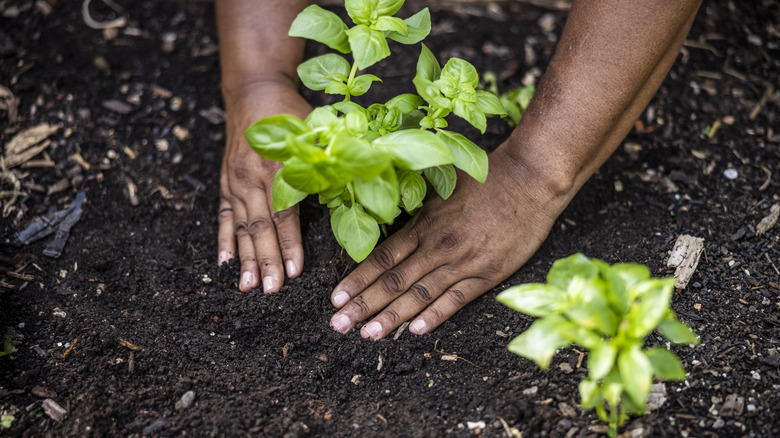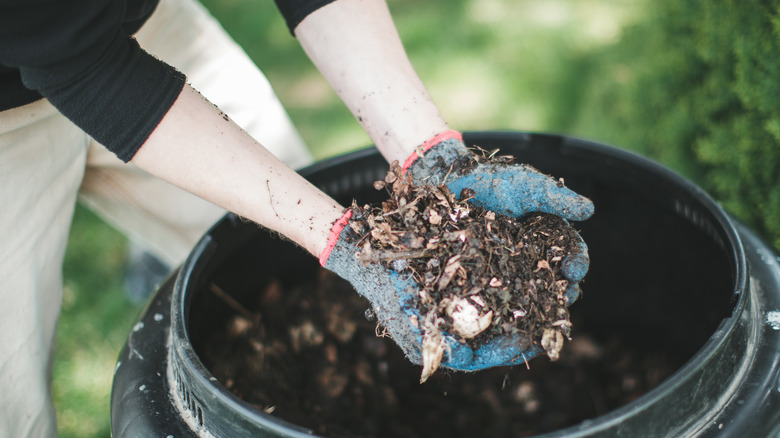Are Pencil Shavings The Unexpected Secret Weapon For A Thriving Garden?
Although back-to-school season indicates that summer is over, gardeners can still take advantage of this time to help their plants grow. Buying the seeds, mulch, fertilizer, soil, and tools for your garden can add up to some big expenses, which is why many gardeners benefit from composting at home as an economical way to ensure that their plants are thriving. Plus, it's helpful for the environment. What you may not know is that you can find compostable items in your child's backpack. Common pencil shavings can be composted and may even be an all-natural way to ward off harmful pests. Instead of throwing out those shavings, add them to your compost bin with all your other organic scraps or use them immediately as a way to repel bugs naturally.
It should be noted that there aren't any reliable scientific studies that prove that pencil shavings are good for plants. There is, however, some anecdotal evidence that demonstrates that they could be beneficial in the garden. Therefore, keep in mind that these tricks may or may not work for you.
If you're worried about the lead in pencils, don't be. Modern pencil lead is actually just a combination of graphite and clay and is not made out of lead at all. Graphite is generally considered harmless to plants. However, the lacquer or paint that coats the outside of some pencils could be harmful. Some packages might not state what type of paint is used, so if you're in doubt, it's best to not use the shavings in your garden.
Why pencil shavings may be helpful in your garden
A good compost pile needs both "brown" matter (things like dead leaves or wood chips) and "green" matter (things like fruit or vegetable scraps) to get the correct balance of carbon and nitrogen. This will break materials down effectively and contribute to the health of the soil. In general, the ideal carbon-to-nitrogen ratio for compost should be between 25:1 and 35:1. Pencil shavings provide the same benefits as wood chips or sawdust (as long as the pencils are made of real wood and not a synthetic material), so they provide some essential brown matter. On top of adding carbon, these shavings can also help the pile smell better, especially if you accidentally add too much green matter. Furthermore, they may also keep some pests away from your compost pile.
If you don't want to wait for the pencil shavings to break down in your compost pile, use them immediately to potentially keep insects away from plants. A vast majority of pencils today are made out of incense cedar, which is a natural insecticide that may ward off pests. The natural smell of cedar repels insects, so you may be able to keep them away without having to use harsh chemicals to kill them. For example, many people build cedar closets as a way of preserving clothes from becoming moth-eaten. According to a 2014 study published by Environmental Entomology, cedarwood oil is effective against ants and ticks as well. Of course, cedarwood oil isn't the same as incense cedar pencil shavings, but this may point to the effectiveness of this material in general.
How to use pencil shavings in the garden
You can add pencil shavings to your bin every so often or collect large amounts of them over time. Make sure you're also adding other sources of brown matter (like dead branches or leaves) and green materials as well. Calculate your carbon-to-nitrogen ratio by keeping track of what you are throwing into your compost pile, how much carbon or nitrogen is in each item, and doing a little math to get the ratio.
Steer clear of placing chemicals and harmful materials that wouldn't break down over time (like plastic) into your compost bin. Wooden shavings tend to be curly since the material generally keeps its structure during sharpening, while other materials often break apart easily. Check the package labels to see if your pencil shavings are non-toxic, and keep in mind that colored pencils might contain harmful pigments or dyes. Of course, always make sure you're not including other parts of the pencil like the metal ferrule or eraser, too.
If you want the bug-repelling benefits of pencil shaving immediately, anecdotal evidence suggests that you can line your garden bed with the shavings directly much like you would do with a bag of cedar chips, or sprinkle them around the base of your plants. Naturally, gardeners are always looking for ways to be environmentally conscious, so this trick might be an eco-friendly way to keep bugs out of your garden. However, more invasive bug infestations may require more aggressive treatments, so keep in mind that a few pencil shavings probably won't keep your garden bug-free for long.

